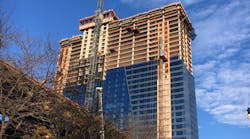Latest from Industry
Rep News - December 20, 2024 Update
Rep News - December 6, 2024 Update
3Q 2024 Business Conditions & Latest Pricing Trends
AD-IMARK Finalize Merger
Vacant office space in the U.S. declined by 10 basis points (bps) during the third quarter of 2017 (Q3 2017) dropping to 12.9 percent, according to the latest analysis from CBRE. Continuing a recent pattern, suburban office markets continued to set the pace for declines.
The vacancy rate in suburban markets decreased 20 bps, to 14.1 percent, while downtown vacancy dipped to 10 bps to 10.6 percent. Vacancy continued to fall in a majority of U.S. office markets, and the national office vacancy rate remains near its post-recession low.
”The slow, steady improvement in the office market continued in the third quarter after a second quarter pause. Demand remains positive but modest,” said Jeffrey Havsy, Americas’ chief economist for CBRE, in a press release.
The largest metro-area declines were recorded in Trenton (220 bps), Las Vegas (140 bps) and Phoenix (110 bps). Tucson, Detroit, Memphis, Stamford and Richmond, each declined by 80 bps or more. In the past four quarters, the vacancy tightening has been found in mid-sized markets located predominately across the Sun Belt, including Tucson, Las Vegas, Albuquerque, Louisville, Orlando, Richmond, Detroit, Sacramento, Phoenix, Memphis and Jacksonville.
“September’s job report showed continued growth in office-using jobs and that growth is expected to lead to continued but relatively modest positive absorption. The supply pipeline in certain markets has started to increase and this may lead to a slowing of the vacancy decline in early 2018,” added Havsy.









